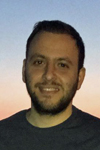Student experience
Our students and graduates share their experience of studying an Operational Research MSc programme at the University of Edinburgh.
Student blogs
Visit our student blog, "Blogarithms", to learn about what life is like as a maths MSc student here in Edinburgh! Our student bloggers come from all over the world, and study a variety of mathematics MSc programmes.
University of Edinburgh Blogarithms
Graduate testimonials
MSc Operational Research

Currently: working on a PhD on power systems optimization at ETH Zürich
During my undergraduate studies in Industrial Engineering, I had a lot of exposure to OR as it was constantly used as a tool in economics and engineering. This omnipresence of OR due to the need to make complex decisions was my motivation to deepen my knowledge in a specialized OR masters program. After looking at different degree programs all over Europe, the one at UoE was the most convincing. It offered a good mix of theoretical and applied courses, a great freedom of choice in specializations, and professors who are leading experts in their field. In addition, Edinburgh is a wonderful city to live in that is hard to beat.
Looking back, I can say that all of this is true, and I am very glad that I made this decision! What I hadn't expected, however, was the high workload. Due to the many tasks and projects, time was always tight. On the other hand, the lecturers and tutors help you a lot to consolidate your knowledge, apply it and deepen your methodological skills. The second surprise was the intensive supervision and support from the professors. Thanks to the personal tutor and the small classes, there was always a renowned professor nearby to answer your questions. Overall, my expectations were exceeded, and I recommend this program to anyone interested in OR related fields. I am now a PhD student at ETH Zürich doing research in the field of power systems optimization.

While nearing the end of my bachelor's degree in econometrics & operational research, I realised I wanted to continue in the operational research field. After looking at operational research master's at different institutions, I found that the courses taught at the university of Edinburgh aligned best with my interests.
Since I had already done a fair bit of operational research in my bachelor’s, the first semester was quite easy for me. However, the courses were very rigorous and I felt like my proving and problem solving skills greatly improved. The second semester focused more on the applied aspect of operational research with courses such as operational research in the energy industry and optimisation methods in finance. The MSc concludes with a three month period where you have to write a dissertation. I thoroughly enjoyed writing the dissertation and my supervisor went above and beyond to help me with any questions I had.
All in all, I think the operational research with computational optimization course is an amazing MSc for anyone who wants to improve their mathematical optimisation skills. Although, the course load was high, the support offered by both the academic and professional services staff is incredible and my personal tutor was there whenever I needed him. I have made friends with people from all over the world and I am excited to see where everyone will end up. Currently, I am a first year PhD student in Edinburgh researching how to apply interior point methods to combinatorial optimisation.

From: China
During my first master’s in engineering management, I found that many decisions made in the supply chain, from inventory replenishment, warehouse operations, to transportation scheduling, are supported by the theory of operational research. This led me to this MSc program where I could dive deeper into mathematical techniques as well as their applications to solve real life problems. And I really appreciate that Edinburgh warmly embraced me and gave me an opportunity even though I have no previous background in a mathematics major.
I would say this intense 1-year program has a high work load, at least for me. But this also means that this program really provides a broad range of courses we can freely explore. The comprehensive curriculum covers not only the core skills of operational research that can equip you well for further study but a wide range of optional courses in different specializations that can help you find your interests. Personally, I felt my skills in mathematical modelling and problem solving greatly developed just after the first semester, and I couldn’t imagine I would experience such a rich year when I started a year ago.
I took courses online during the whole year, and this is a hard year for everyone. But the good thing was that the lecturers were easy to approach, and we could simply post our questions on Piazza to get feedback from each other, or just drop in the tutorials and office hours to discuss anything related to the course with the lecturer, which all made me feel I was in a friendly community and not alone.
This is a challenging but worthwhile program, and I’m grateful to everyone I met and everything I experienced this year. Sometimes we must accept finite disappointments in stochastic life, but the only deterministic thing is that we will never lose infinite hope.

From: Portugal
Currently: working on a PhD in Optimization and OR at the University of Edinburgh
After having done an undergraduate in Mathematics, I saw this MSc in OR as the perfect opportunity to deepen my knowledge in Optimization with a focus on practical applications. My time at the University proved me right.
The first semester set the foundations of Optimization and in the second semester there was a varied range of courses to choose from and tailor the MSc to each student’s interests. These courses covered many applications of OR from logistics to energy. The final dissertation project gave me a chance to research on an interesting problem which I now continue to work on as part of my PhD. In particular, this year has allowed me to develop programming and modelling skills. It required good time-management skills as it is an intensive programme with many individual and team projects. However, anyone who has done it will tell you, it is a very interesting programme and it is really worth the work. During the MSc, there were also many opportunities to get in contact with companies and people working in OR through talks and competitions. Furthermore, there is a great deal of guidance and support from the school’s staff with professors who are world-leading researchers and enthusiastic teachers.
Finally, when the COVID-19 pandemic started, the University transferred to online-teaching within a week and this transition was made very comfortable and stress-free for students.
Currently, I am on the first year of my PhD in Optimization and OR at the University of Edinburgh researching on an application of bilevel programming in the energy industry.

From: Germany
With my undergraduate degree in mathematics being of primarily theoretical nature, I wanted to pursue a master’s degree focussing more on the actual application of mathematical techniques to solve real-world problems. The wide selection of up-to-date courses and its practical orientation made the MSc in Operational Research at the University of Edinburgh the ideal choice.
After covering the basics in the first semester, the programme allows for specialisations in various areas such as Data Science or Risk. I decided to choose most of my classes and also my dissertation project from the field of (integer) optimization. While the theory was well explained in the lectures, I particularly enjoyed the many lab sessions and projects during the semester. Using different programming languages and software packages, we had the chance to directly apply the methods discussed in class to numerous problems from finance, logistics and telecommunications.
It was especially this high amount of continuous assessment and coursework which made the programme as intense as described in all the student testimonials. However, teamwork was always encouraged, and everyone tried to help each other out. With students coming from all over the world and all kinds of academic backgrounds, the OR class was a great group of people to be part of.
To top it all off, the commitment of this programme’s teaching staff is truly outstanding. The lecturers are very friendly, approachable and go out of their way to answer all your questions and support you with your studies.
MSc Operational Research with Computational Optimization

From: UK
Currently working: as an Operational Researcher at the Department for Transport
After studying primarily pure mathematics in my undergraduate degree, I wanted to learn more practical and applied skills, which led me to studying for an MSc in Operational Research at the University of Edinburgh.
There is a lot of flexibility when it comes to choosing courses, so you can really tailor the programme to your individual interests, whether that be optimization, data science, statistics or anything else. Personally, I discovered that I particularly enjoyed the optimization courses, and so during the year I changed my programme to OR with Computational Optimization.
One thing I really loved about the programme was the international make-up of the students, because it meant that everyone had their own unique perspective and areas of expertise, making working together really enjoyable. Moreover, the lecturers were all very enthusiastic and willing to help, especially in the labs or workshops that accompany the lectures, and this meant there was always lots of support whenever I had questions.
Studying this programme definitely helped my career prospects, and I am now using many of the skills I learned at Edinburgh in my analytics job in the airline industry. Despite the applied nature of the programme, most courses still possess a strong theoretical component, which has prepared me well for a PhD, should I opt to undertake one in the future.

From: Bulgaria
Currently working: on a PhD in Optimization and OR at the University of Edinburgh
I studied Computer Science and Mathematics at the University of Edinburgh as an undergraduate degree. I always liked maths more, so I wanted to do more of it whilst still doing some programming. The Operational Research with Computational Optimization MSc seemed like a perfect match for me and it lived up to my rather high expectations.
It is an intense 12-month programme which greatly expanded my understanding of Optimization and Operational Research. The applied courses accurately represent the type of work in industry and the theoretical parts provide enough proofs for any enthusiast. There is much flexibility when choosing courses, once the basics are covered, which ensures everyone takes the courses best suited to their skills and interests.
Additionally, the MSc students were all very good, friendly and from all over the world - I got to know some exciting people and we still keep in touch. I proceeded to a PhD in Linear Optimization in the very same OR group (University of Edinburgh School of Maths) and enjoy helping out with tutoring some of the courses.
MSc Operational Research with Data Science

From: Slovenia
Currently working: working on a PhD in Optimization and OR at the University of Edinburgh
As I neared the end of my undergraduate education in Economics I developed an understanding of what I enjoyed working on most: quantitative problem solving. After quite a bit of research I concluded that the natural step forward was to pursue a postgraduate degree in Operational Research.
I was slightly worried that the less mathematical nature of my undergraduate degree would be a hindrance, but it turned out to be a manageable and deeply rewarding transformation. The Operational Research with Data Science programme offers a broad breadth of content. I engaged with a variety of topics such as a number of OR courses in different optimisation and modelling approaches, programming, machine learning, and even a course on computational approaches in cognitive neuroscience. To name two particularly interesting projects I did: optimising the placement of missile defence platforms in a hypothetical war around the Sea of Japan, and a reinforcement learning project where we reproduced algorithms developed by DeepMind that learned how to play games on their own. You are given a lot of freedom about your course choices, meaning you can tailor the programme to your interests or explore topics outside of your comfort zone.
For my dissertation I effectively did a research internship with an external organisation where I was tasked with designing an approach to mend a predictive modelling problem. This meant that through regular meetings with the partner organisation, I also developed the skills needed to be an effective research scientist in industry. They offered me a job, but I enjoyed the work enough to stay on and pursue a PhD.
My MSc year proved to be a time of intense personal development in spite of the endless lockdowns and distracting reopenings. The School and especially the OR team go out of their way to be supportive and provide a great quality of teaching. Even though the majority of the year was done completely remotely, I never felt like the experience was diminished, which should be a testament to how well run this programme is.

From: UK
Currently working: as a Data and Analytics graduate at NatWest Group
Prior to starting this MSc, I had studied mathematics at undergraduate level, which included a year in industry where I worked in the finance department of The Walt Disney Company as a retail analyst. This year sparked my interest in data, and during my final year at university I took a module in Operational Research and discovered a new passion for the subject. Finding the Operational Research with Data Science MSc at Edinburgh was the perfect combination of both these interests.
Reflecting upon the MSc, I am realising just how much I learnt in the space of only one year, and how enjoyable this was. The programme provides a great mix of modules with something for everyone, no matter their individual interests. I loved this variety and it meant that my semesters were full of topics I had a genuine interest and enthusiasm in. Additionally, the dissertation was a great experience (although hard work!). I got the opportunity to do mine in partnership with an industrial partner, which was a great way to put into practice all the theory I had learned.
Currently, I am working as a Data and Analytics graduate at NatWest Group, for which this MSc set me up brilliantly. From the immense number of technical skills I gained and improved upon during the year to problem-solving, team-work and communication skills, this past year couldn’t have been more valuable for my job.

From: The Netherlands
Currently working: as a Data Scientist for the municipality of Amsterdam
Coming from a background in business and economics, my road to this MSc was slightly unusual, but boy, am I glad I made the journey! And I wasn’t anywhere near the only one with a less-than-straightforward background, which was in fact one of the best parts of the programme: everyone brought a different set of skills and knowledge to the table, so that exchanging ideas and helping each other out was super valuable and quickly became normal. Combined with the high workload, this also meant that we all got close quickly, because what better way to bond than by cursing an assignment together late at night, but figuring it out in the end?
As stupid as it sounds, at the end of the first semester I already felt so much smarter than when I started, and now that I’ve finished, I can’t believe how much I’ve learned in just one year. Moreover, I found all of it interesting, because the wide range of optional courses allows you to tailor the programme completely to your interests. I decided to take about half of my optional credits in the School of Mathematics and half in the School of Informatics for the data science specialisation, but I could probably do another two semesters without getting bored. The programme is a good mix of theory and applications; no matter your course selection, you’ll always get the theoretical foundations required to understand more complicated methods, and you’ll always acquire practical skills such as programming and presenting. The last thing I should mention is the great staff involved in the programme, who are friendly, knowledgeable, and noticeably interested in teaching.
Besides all the raving reviews on this page, it turned out employers also like the degree, because landing a job was straightforward! All in all, I can only recommend the MSc: it’s hard work, but absolutely worth it.
MSc Operational Research with Risk

From: Chile
Having worked for 3 years in the banking industry, I realized the high contribution that people with good quantitative background make in developing new and better regulation standards. This led me to look for a MSc degree where I could apply mathematics in solving real life problems. After searching deep, I found the best choice was the Masters in Operational Research at the University of Edinburgh. Having finished this Master’s degree, I can confirm that this choice was the perfect one.
This programme allows students to have both a strong mathematical basis in optimization and apply these techniques in different real situations. Since in the second semester you can choose the courses that best fit your interests, you are able to specialize and go deep in those topics which will be the foundations for your future career. Personally, as the big data environment we live nowadays requires knowing and applying new and more proficient optimization algorithms, I chose courses in this field. Thus, you can tailor the program as you wish which is a desired feature when you study an MSc.
Finally, students of this program come from different places and backgrounds. Some of them will become your friends with whom you will not only share experiences and have fun, but also create a good support group for those intensive periods the masters has, which are indeed almost along all year.

From: Cyprus
After finishing my undergraduate degree in Applied Mathematics, I decided I wanted to pursue a career in Operational Research and Risk Management. Part of this reason was that during my undergraduate degree I came across with operational research related topics, which fascinated me a lot. Therefore, I decided to pursue a Master in Operational Research, specialized in risk.
One thing that I really loved about the master was that even though it was quite diversified, with a range of courses’ choices, students had the opportunity to adjust the courses chosen, based on their own personal interests. For example, there was a range of choices such as optimization and data science among others. I personally decided to follow a combination of data science and optimization, which provided me with a well-rounded knowledge.
Another thing which I found extremely useful was the fact that this master gives you the opportunity of doing an industrial dissertation. Personally, I had the opportunity to have my dissertation at the Royal Bank of Scotland which was a great stepping stone for my career, since I was given the chance to work alongside experienced professionals of the banking sector and gain fruitful knowledge.
Overall, enrolling in this programme helped me a lot with my career prospects, since now I find myself applying different skills I have learned in the University of Edinburgh, in my current job in PwC.

